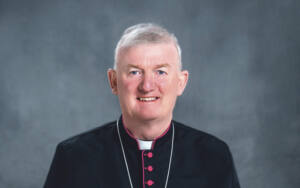
WelCom October 2024
Bishop John Adams, Catholic Bishop of Palmerston North
I write this editorial comment to you from Rome [in September] where, along with Bishop Richard Laurenson of Hamilton, I am attending a course for new bishops.
New Zealand, still considered a missionary country, is under the care of the Dicastery for Evangelisation. Consequently, new bishops from New Zealand gather with other missionary countries from around the world for this programme.
There are 114 of us here in Rome, many bishops from Africa are with us, and many bishops from India also. In my small group I have brother bishops from India, Indonesia, Kenya, Malawi, Nigeria, Sierra Leone, Taiwan, Tanzania, and Zimbabwe. As you might imagine this makes for very interesting conversations, and, although our pastoral realities differ, similar themes have begun to emerge.
One common theme that unites us as bishops from all around the world is the almost unanimous collapse of authentic community within our countries. Although this collapse is happening at different rates around the globe, the Church universal seems under attack from a relentless global drive for individualism, the rise of the ‘sovereignty of the self’ and the decline of ‘space’ for the other.
The symptoms of this malaise result in a collective lack of purpose, and a collective lack of purpose leads to the phenomenon which we witness all to regularly of people ‘speaking past each other’. The increasingly sectarian environment of world politics is surely an example of this decline. So, with our own politicians here in New Zealand surely heading in this direction we might ask ourselves what response might our Christian communities make, or more specifically, what course of action can we expect from our own Catholic Church?
This very question was discussed by the new bishops as part of a presentation by Cardinal Michael Czerny sj the head of the Roman Dicastery for Human Development. He reminded us that a Catholic community is always required to act with honesty, humility, faith and spirituality. If we do not act in this way, there is not much we can contribute to promote real reconciliation in our society. We may appear to be making limited progress now and then; however, chances are the pathways we propose won’t lead anywhere, and we run the risk of prolonging or even aggravating divisions and conflicts. If we fail to embrace the utterly ‘other’, the other who needs us, then ultimately, we are serving a specific or exclusive outlook, which in the end is a perversion of true Catholicism.
This does not mean we take up positions of absolute indifference to our Catholic heritage, but it does mean we never tire listening to the voice of the other. Again, this is not to ignore what divides us but rather to confront what divides us with open hearts in order that true dialogue might begin. Yes, even if this act of listening opens us to ridicule and the charge of betraying the clear truths of our faith, we should take that risk. There is a golden rule at stake here – we ought to listen to the other to the extent that we wish to be listened to by them. It’s only when we proceed in this manner that our response can really be an anointed one.
The cohesive moral image that was once led and championed by the Church, is still powerful today. What is absent are opportunities to enter into true and meaningful conversation about it. In the absence of these opportunities, it is over to us to instigate occasions for plain speaking by firstly going to places of division with the intent of truly listening. Its then, and only then, that we may enter into honest and patient negotiation. Sheer diplomacy and our natural and social intelligence are not enough – we will always require the reliable action of the Holy Spirit to allow us to be agents to conversion. What a joy it is when we witness the healing of division and conflict in ways never dreamt of by either party.
Let us not lose sight of the hope of our Lord Jesus himself when he uttered these words in John’s Gospel:
‘I pray that they will all be one, just as you and I are one – as you are in me Father, and I am in you. And may they be in us so that the world will believe you sent me.’ – John 19:21